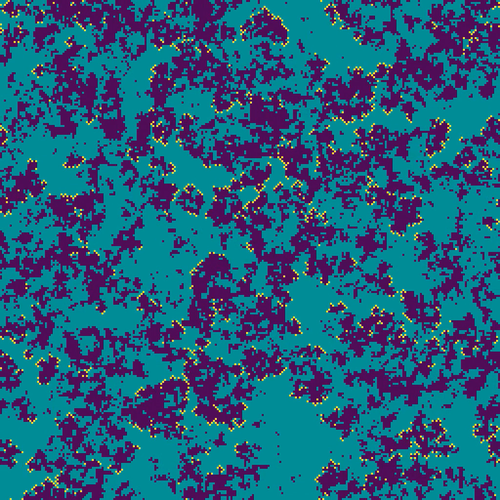
ALIZON Samuel
- Centre interdisciplinaire de recherche en biologie, CNRS Délégation Paris B, Paris, France
- Coexistence, Competition, Epidemiology, Evolutionary ecology, Host-parasite interactions, Phylogeny & Phylogeography, Theoretical ecology
- recommender
Recommendation: 1
Reviews: 0
Recommendation: 1

Easy, fast and reproducible Stochastic Cellular Automata with chouca
An R package for flexible and fast Stochastic Cellular Automata modeling
Recommended by Samuel Alizon based on reviews by Broder Breckling and 1 anonymous reviewerStochastic Cellular Automata (SCA) are a popular modelling tool because in, spite of their simplicity, they can generate a variety of spatial patterns. This makes them particularly appreciated, for instance, to validate the insights of analytical or semi-analytical spatial models that make simplifying assumptions, e.g. moment equations models. A first limit to SCA are that as soon as details are added to the model, reproducibility issues may occur. Computation speed is also an issue, especially for large populations. The work by Génin et al. addresses these two issues through the development of an R package, chouca.
The use of the package is designed to be as smooth as possible: users only need to define the type of possible transitions along with their rates, the parameter values, the number of neighbours, and the initial state of the landscape. The main function returns the population dynamics of each state and even the final state of the landscape.
In addition to its flexibility, an asset of chouca resides in its use of the Rcpp package, which compiles the model designed by the user in C++. This allows for high computation speed, which can be further boosted by using parallelising options from R.
In their manuscript, the authors use ecological models to illustrate the more advanced possibilities opened by chouca, e.g. in terms of graphical interpretation or even to estimate parameter values by computing likelihood functions (the implementation in R does make it very appropriate for statistical inference in general). The package still has some limitations, and, for example, it currently only applied to 2D rectangular grids and it cannot include elaborate movement processes. However, some of these could be addressed in future releases and chouca already has the potential to become central for SCA modelling, both for beginners and expert users, especially in ecology.
References
Alexandre Génin, Guillaume Dupont, Daniel Valencia, Mauro Zucconi, M. Isidora Ávila-Thieme, Sergio A. Navarrete, Evie A. Wieters (2024) Easy, fast and reproducible Stochastic Cellular Automata with chouca. bioRxiv, ver.6 peer-reviewed and recommended by Peer Community in Ecology https://doi.org/10.1101/2023.11.08.566206